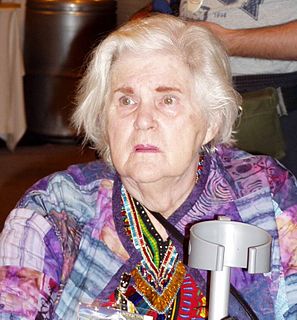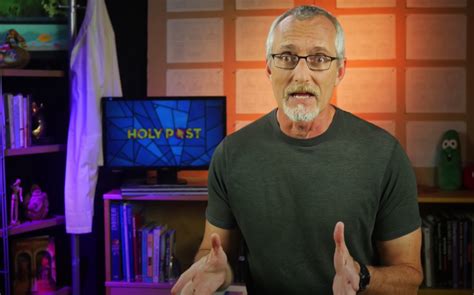A Quote by Anne McCaffrey
Tell the readers a story! Because without a story, you are merely using words to prove you can string them together in logical sentences.
Related Quotes
It's only a story, you say. So it is, and the rest of life with it - creation story, love story, horror, crime, the strange story of you and I. The alphabet of my DNA shapes certain words, but the story is not told. I have to tell it myself. What is it that I have to tell myself again and again? That there is always a new beginning, a different end. I can change the story. I am the story. Begin.
Telling the complete story of VeggieTales would require much more time than we have before us tonight. Since this is Yale, I decided to craft a shorter version of the story, using very large words. Remembering though that I was kicked out of Bible College before I'd had a chance to learn many very large words, I concluded that my only remaining option was to tell the story simply, using simple words, and chance the consequences.
A writer is a person who cares what words mean, what they say, how they say it. Writers know words are their way towards truth and freedom, and so they use them with care, with thought, with fear, with delight. By using words well they strengthen their souls. Story-tellers and poets spend their lives learning that skill and art of using words well. And their words make the souls of their readers stronger, brighter, deeper.
We who make stories know that we tell lies for a living. But they are good lies that say true things, and we owe it to our readers to build them as best we can. Because somewhere out there is someone who needs that story. Someone who will grow up with a different landscape, who without that story will be a different person. And who with that story may have hope, or wisdom, or kindness, or comfort. And that is why we write.
So tell me, since it makes no factual difference to you and you can't prove the question either way, which story do you prefer? Which is the better story, the story with animals or the story without animals?' Mr. Okamoto: 'That's an interesting question?' Mr. Chiba: 'The story with animals.' Mr. Okamoto: 'Yes. The story with animals is the better story.' Pi Patel: 'Thank you. And so it goes with God.
Vera said: 'Why do you feel you have to turn everything into a story?' So I told her why: Because if I tell the story, I control the version. Because if I tell the story, I can make you laugh, and I would rather have you laugh at me than feel sorry for me. Because if I tell the story, it doesn't hurt as much. Because if I tell the story, I can get on with it.
I do open endings on purpose. I expect a lot from my readers. I want them to do much of the work, because I believe that the story is built by the reader, not by the writer. I like having an open ending to a standalone fantasy, because it allows a continuing story to be written in the hearts of the readers.
[On George H.W. Bush:] A man who wishes to lead the Western world should be able to find the right words, string them together in coherent sentences, and steer them to an intelligible conclusion. His sentences have the stuttering start of an old car on a cold morning. They never run smoothly. The only speech part that he has mastered completely is the non sequitur.
A story is a way to say something that can't be said any other way, and it takes every word in the story to say what the meaning is. You tell a story because a statement would be inadequate. When anybody asks what a story is about, the only proper thing is to tell them to read the story. The meaning of fiction is not abstract meaning but experienced meaning.
I think that people have to have a story. When you tell a story, most people are not good storytellers because they think it's about them. You have to make your story, whatever story it is you're telling, their story. So you have to get good at telling a story so they can identify themselves in your story.
When you tell a story, there are imperatives of structure, of style, of pacing and all of this, that are there simply because you want to make it a good story. When do you introduce your characters? When do you put them onstage, when do you take them off the stage? How do you weave the different threads of the narrative together?
Even if you want to take the American story, they say we used chemical weapons the same day the team or the investigation team came to Syria ; is it logical ? It's not logical. Even if a country or army wanted to use such weapon, they should have waited a few days till the investigation finished its work. It's not logical, the whole story doesn't even hold together.
What drivel it all is!... A string of words called religion. Another string of words called philosophy. Half a dozen other stringscalled political ideals. And all the words either ambiguous or meaningless. And people getting so excited about them they'll murder their neighbours for using a word they don't happen to like. A word that probably doesn't mean as much as a good belch. Just a noise without even the excuse of gas on the stomach.

































